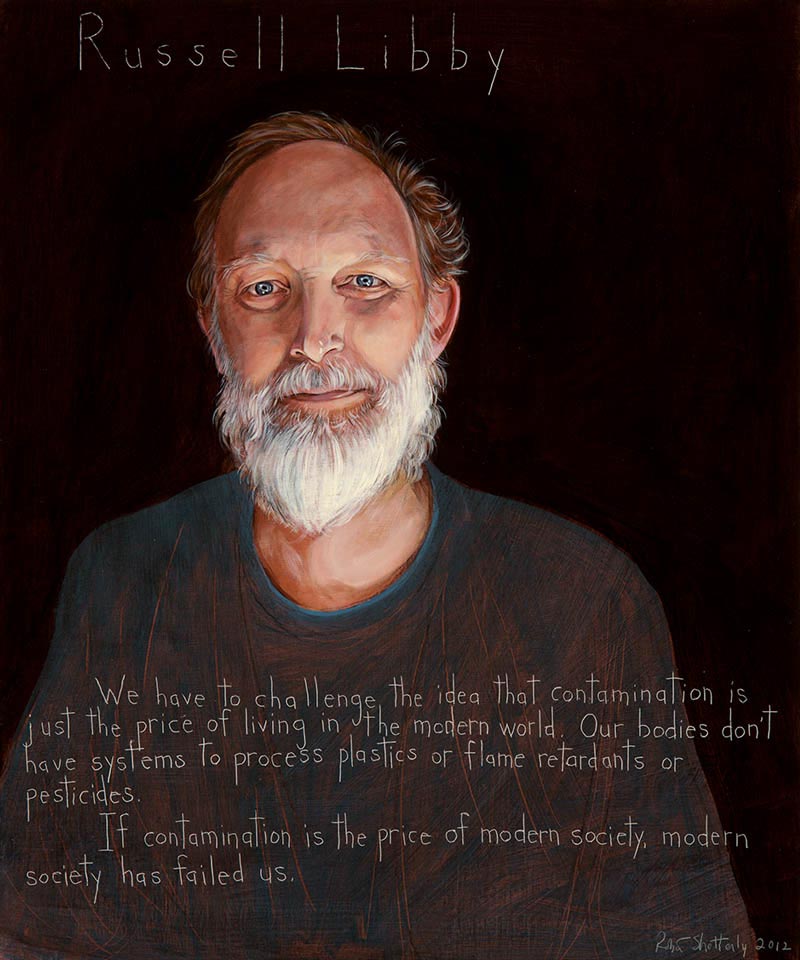
Russell Libby
Organic farmer, Campaigner for Pollution Free Local Food Economies : 1956 - 2012
“We have to challenge the idea that contamination is just the price of living in the modern world. Our bodies don´t have systems to process plastics or flame retardants or pesticides. If contamination is the price of modern society, modern society has failed us.”
Biography
Environmental visionary Russell Libby likes to quote his distant relative, the late Pulitzer Prize-winning poet Robert P.T. Coffin, when he describes his personal philosophy: “We eat from the earth, the sky, the water.” Libby sees a “post-petroleum world” in which we are so intimately connected to our environment that it literally becomes our body and thereby determines whether we live or die.
According to Libby we need to take action to protect the environment: “It’s up to us—up to all of us—to change the world so every time we look around, we recognize those basic principles of life…I want to talk about our shared responsibility to leave this place better than we found it. Not better from a corporate, make-more-money mode, but a place of beauty, a place that gives us great pleasure throughout our days and throughout our lives. Because that sense of beauty, of pleasure in what we are doing each day, is what is going to carry us forward through the difficult times that we live in now, and the more difficult times that lie ahead.”
Libby has come to his views through a combination of personal experience and academic training. He planted his first garden in his hometown of Sorrento, Maine, when he was in fourth grade. With degrees in resource economics, he launched a lifelong career in food and agricultural policy at the state, regional, and national levels while also working—with his wife Mary Anne and their three daughters—his own “Three Sisters Farm” in Mount Vernon, Maine.
As executive director of MOFGA (Maine Organic Farmers and Gardeners Association), Libby oversaw the organization as it became the country’s largest state-level organic association—with paying members in more than 6,500 households and businesses, 418 certified organic farms and processing operations, a 400-acre, year-round education center, more than 1,500 volunteers and 32 employees.
Healthy living conditions—for people and the planet—have been at the forefront of Libby’s efforts. “This issue of health,” he says, “is only partly a personal one.” We can make healthy choices and still suffer from choices made by others, says Libby. And he knows this firsthand, having been diagnosed with two forms of cancer “despite a good diet and lifestyle through the years.”
“Where did the cancers come from?” he asks. “I was born in a paper company town, filled with the smell of sulfur. I raked blueberries in commercial fields at the end of the era of DDT. I worked on a golf course where diazinon was commonly used, and organophosphates and herbicides were applied…I was part of a Body Burden study, testing for the presence of [toxins], and I tested high on many…These are systemic problems, and we need to talk about them that way. We need to get toxics out of the system. Out of the food system. Out of the consumer products system. Out of the environment in general,” he says.
Libby wants us to move from plundering the earth to protecting it—to that post-petroleum world in which we undo the harm we’ve caused by depleting millions of years of stored natural resources in just a few generations. “Let’s work really hard at undermining the entire idea of corporate food,” he says, suggesting instead that we should “know who produced everything we eat. And how it was produced. That would be transformational.”
And, he says, “We have to realize that it’s late; it’s very late.” He emphasizes that anyone who pretends time is not a factor in the rescue of the earth (and our species) is not telling the truth: “It’s a cynical attempt to protect the status quo for a few powerful people—who have power only because we let them.”
“If this all sounds somewhat political, it is,” says Libby, who is no stranger to direct political engagement. In addition to his environmental work, Libby has served on state government and university panels, as well as his local school board, planning committee and board of selectmen.
For Libby, the heart of political action is talking to one another and acting in concert: “We know that we can grow the food we need to eat, and grow it with minimal energy inputs. Now we need to share with the public the knowledge that we’ve acquired and that we share with one another. We know we are addicted to oil. [But] each seed we plant this year is another way to capture sunlight and convert it to food. Let’s get growing!”
Resources
Programs
Americans Who Tell the Truth (AWTT) offers a variety of ways to engage with its portraits and portrait subjects. Host an exhibit, use our free lesson plans and educational programs, or engage with a member of the AWTT team or portrait subjects.

Education
AWTT has educational materials and lesson plans that ask students to grapple with truth, justice, and freedom.

Exhibits & Community Engagement
AWTT encourages community engagement programs and exhibits accompanied by public events that stimulate dialogue around citizenship, education, and activism.